-
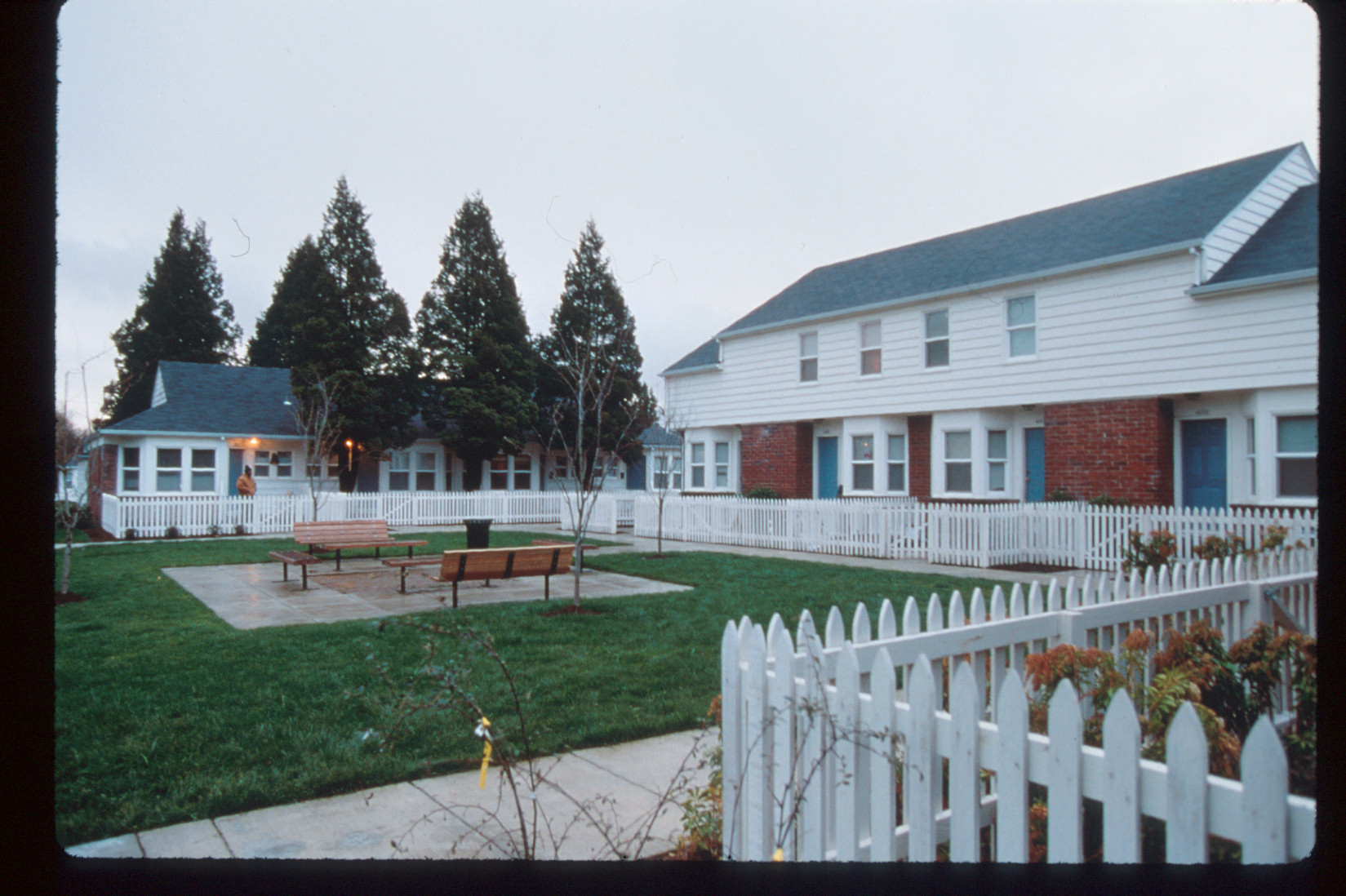 Maya Angelou Community Initiative
Maya Angelou Community Initiative 1995 Rudy Bruner Award for Urban Excellence - Gold Medal
The Maya Angelou Community Initiative is a grassroots redevelopment plan to provide long-term affordable housing to female-headed households in Portland, Oregon. The initiative renovated a deteriorated apartment complex to provide 42 units of sustainable, long-term, low-income housing primarily for households headed by single females. Supported by the nonprofit Housing Our Families, the initiative has successfully redeveloped an underused section of Portland’s troubled Boise neighborhood through an exceptionally democratic and inclusive process engaging all members of the community.
Evidence of the initiative’s success include increased home ownership, reduced crime, significant growth of community organizations, and a greater sense of community. Ongoing programs continue to make improvements to the neighborhood and support economic growth in the area.
-
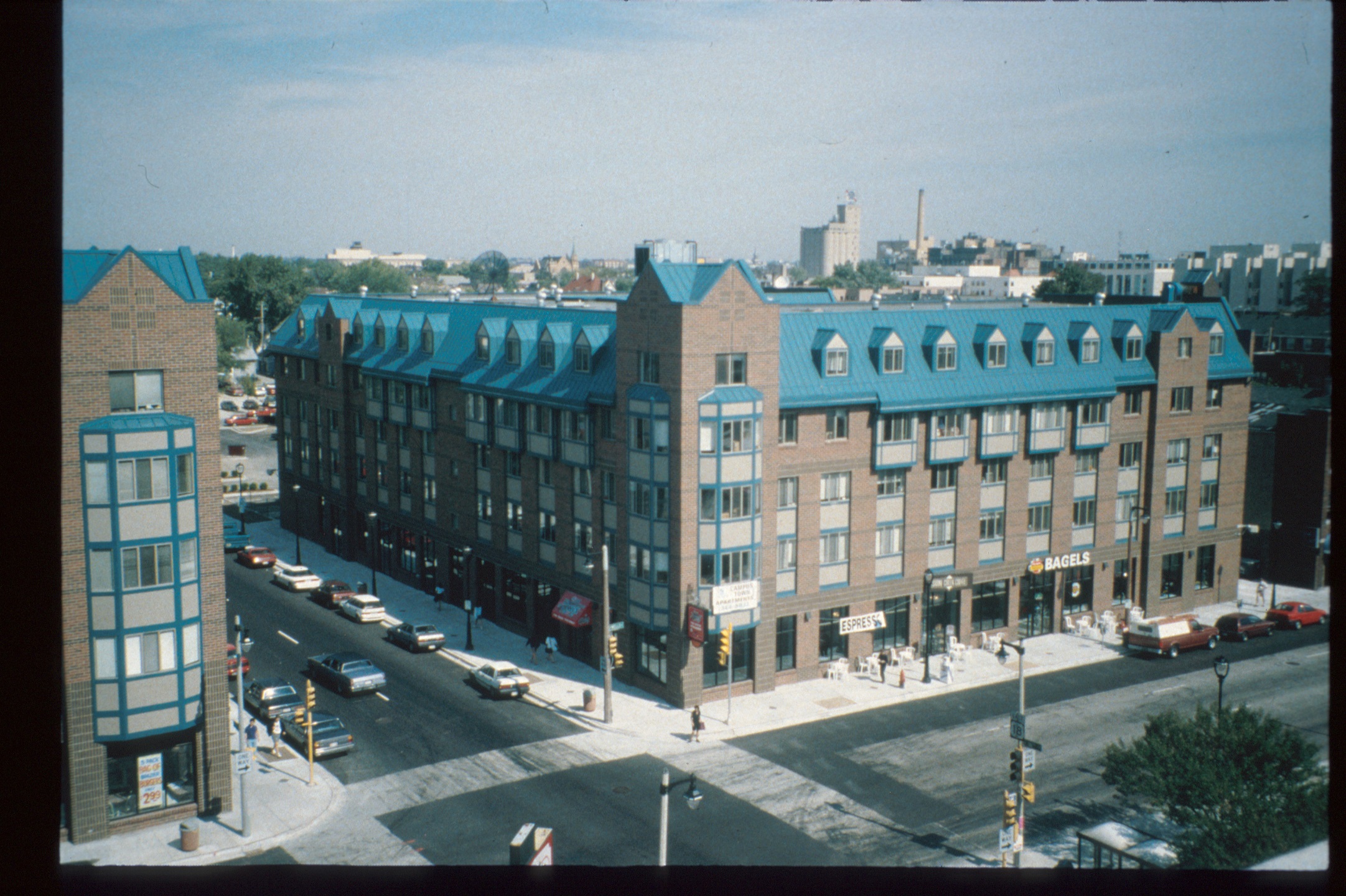 Campus Circle
Campus Circle 1995 Rudy Bruner Award for Urban Excellence - Silver Medal
Campus Circle, launched by Milwaukee’s Marquette University, revitalized a low-income neighborhood with quality mix-income housing for students and families. The university joined forces with area businesses, community organizations, and residents to develop a comprehensive approach to transforming a 90-square-block area adjacent to its campus. The $9 million university investment included three main components: building new off-campus student and staff housing, rehabilitating low-cost housing for neighborhood residents, and revitalizing commerce by developing commercial properties, all while reducing crime and increasing community involvement.
Campus Circle purchased over 150 properties in the area and created over 88,000 square feet of new commercial space. Crime is down significantly and social services organizations and a police station have been integrated into the circle. More than 150 units for students have been built or renovated, and 188 units of affordable housing for residents was rehabilitated without increasing rents.
-
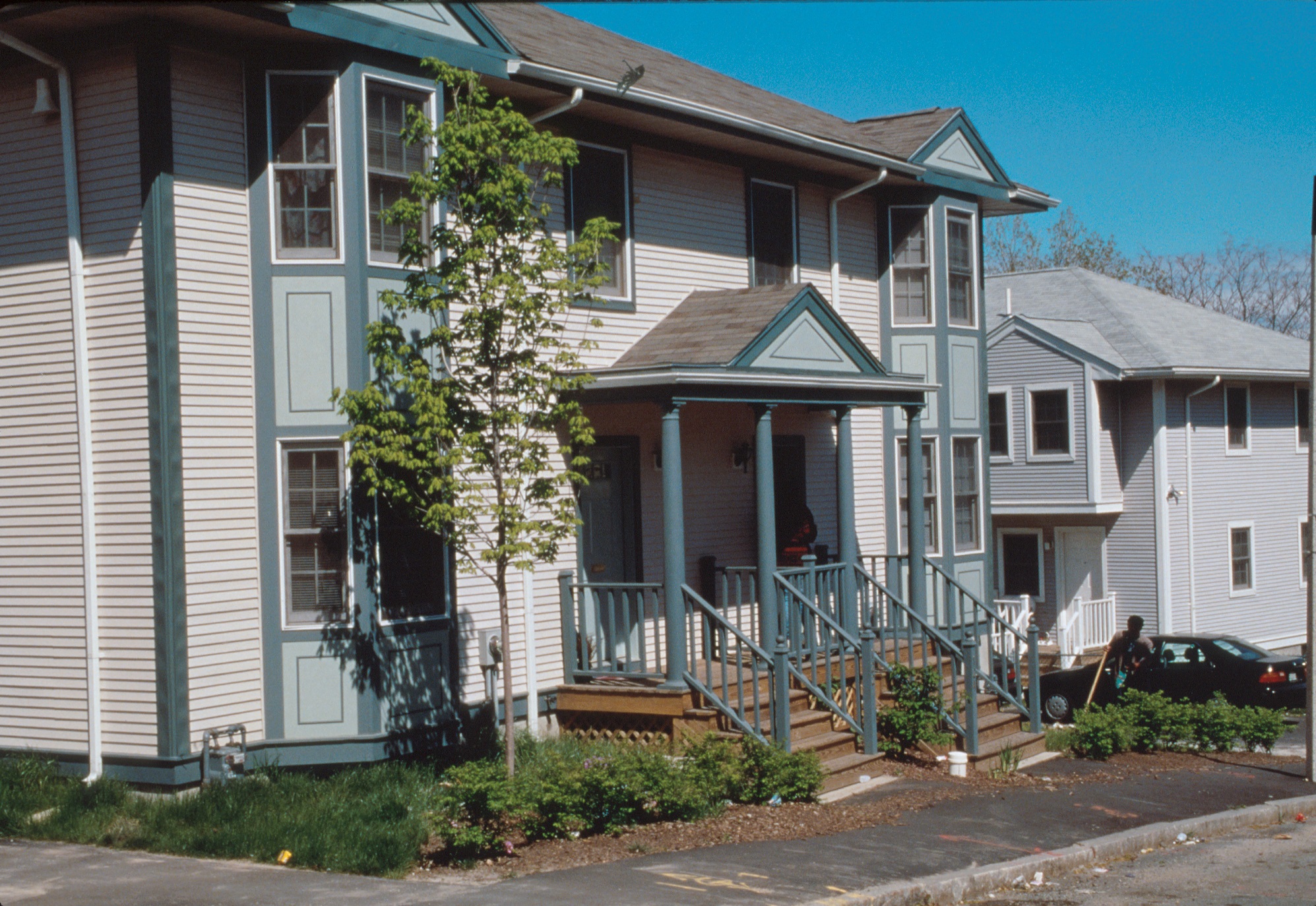 Dudley Street Neighborhood Initiative
Dudley Street Neighborhood Initiative 1995 Rudy Bruner Award for Urban Excellence - Silver Medal
The Dudley Street Neighborhood Initiative (DSNI), a Boston community-based organization, empowered residents to revitalize a depressed neighborhood. With nearly 2,000 members, DSNI includes residents of the Roxbury and Dorchester areas near downtown and representatives of local social service agencies, businesses, and other community organizations. In its mission to reclaim the neighborhood, it purchased vacant land, established a community land trust, and replaced vacant lots and deteriorated buildings with affordable housing units, parks and playgrounds, businesses, and community facilities.
DSNI is an extraordinary example of grassroots, bottom-up organizing. To carry out its comprehensive revitalization plan, it partnered with philanthropists, government officials, banks, businesses, and community development organizations to reverse decades of neglect and disinvestment in this area of Boston. Its redevelopment efforts put a stop to a series of arson fires, cleaned up derelict sites, and built quality housing with ownership opportunities for low-income families, including 36 units of owner-occupied housing at Winthrop Estates.
-
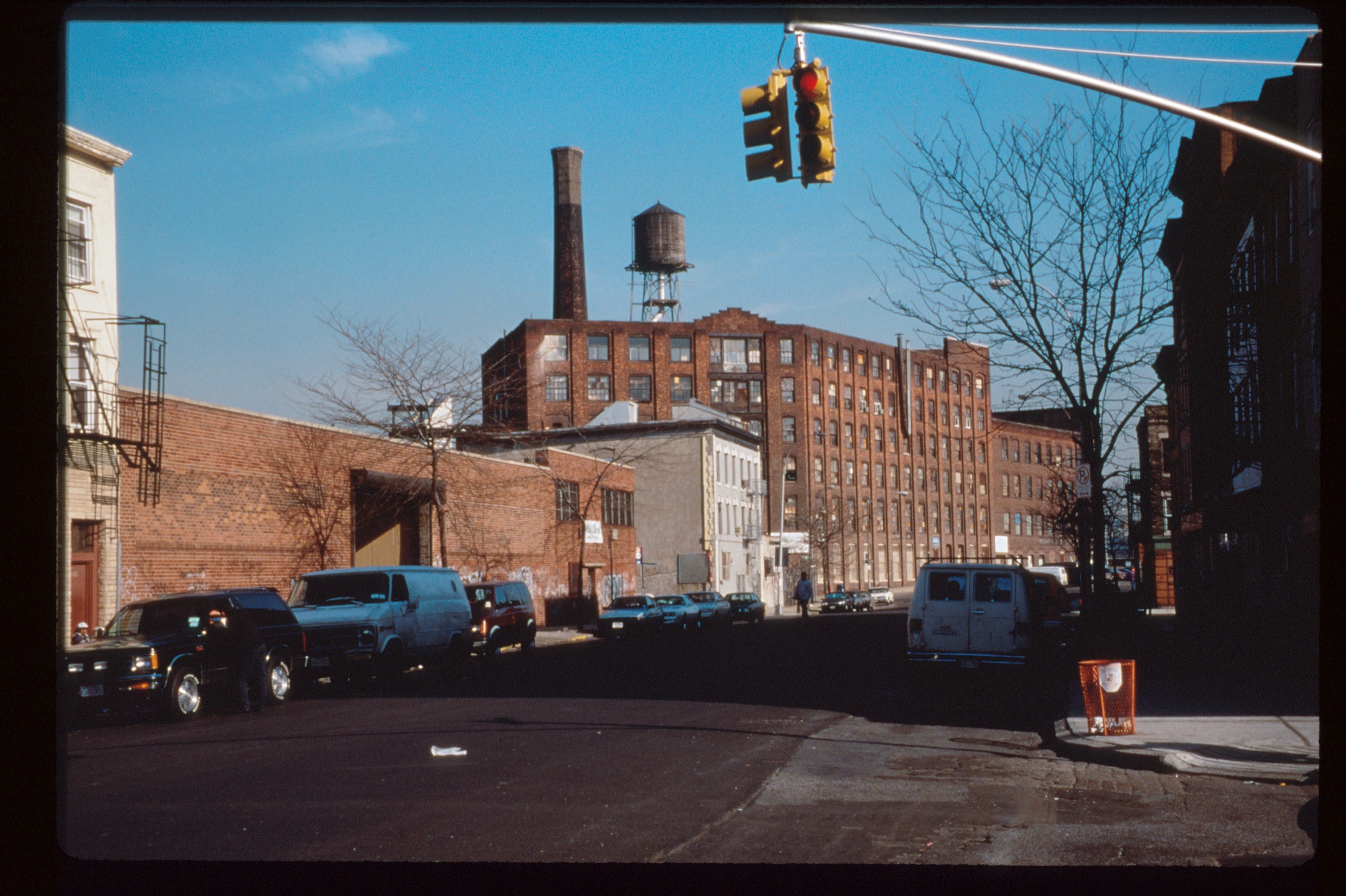 Greenpoint Manufacturing and Design Center
Greenpoint Manufacturing and Design Center 1995 Rudy Bruner Award for Urban Excellence - Silver Medal
The Greenpoint Manufacturing and Design Center (GMDC) in Brooklyn, New York, is an arts and industry complex with incubator and studio space for artisan businesses. The center was created and is managed by a collective of woodworking manufacturers, crafts people, and artisans who formed the collective to purchase their building—a historic mill in Greenpoint—and save the complex when ownership of the building was transferred to the city.
GMDC preserved the historic building and transformed it into a thriving artist and artisan network where expertise, equipment, and supplies are shared and sold. The renovation established space for incubator workshops and studios with easy access to downtown markets. The space protects 21 businesses, creates jobs, and provides support services and workspace for small artisan businesses. GMDC offers an unusual but highly successful model for small-scale, urban industrial cooperatives. It has since expanded to rehabilitate six other manufacturing buildings to create similar spaces for artisans and manufacturing entrepreneurs.
-
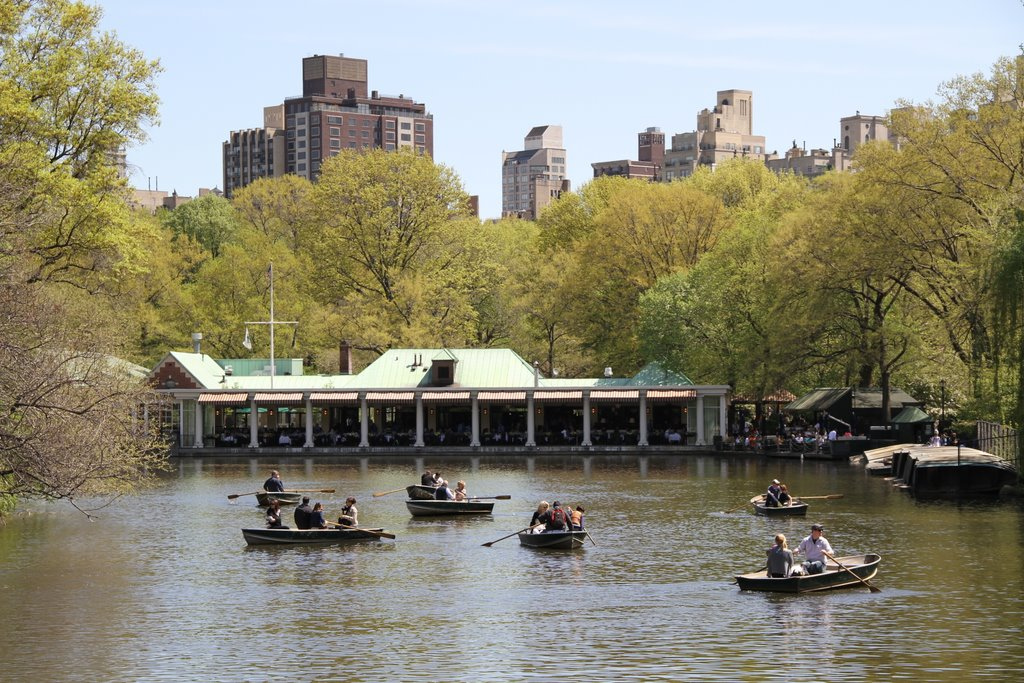 Harlem Meer Restoration
Harlem Meer Restoration 1995 Rudy Bruner Award for Urban Excellence - Silver Medal
The Harlem Meer project restored 17 acres in the northeast corner of New York City’s Central Park, reconnecting it to surrounding inner-city communities. The Central Park Conservancy and City of New York Department of Parks and Recreation worked together to clean up a polluted 11-acre lake, restore the surrounding landscape, renovate a historic boathouse and playground, and build a new discovery center to revitalize the park and nearby neighborhoods.
The project restored a seriously degraded natural habitat and returned a beautiful and important amenity to the area. The Charles A. Dana Discovery Center hosts free community programs and exhibits to educate visitors about the ecosystem and wildlife, and visitors can enjoy a wide range of activities, including fishing, skating, and swimming. The Harlem Meer has helped reintegrate the north and south ends of the park, and the Conservancy worked closely with local neighborhoods throughout the planning process.
-
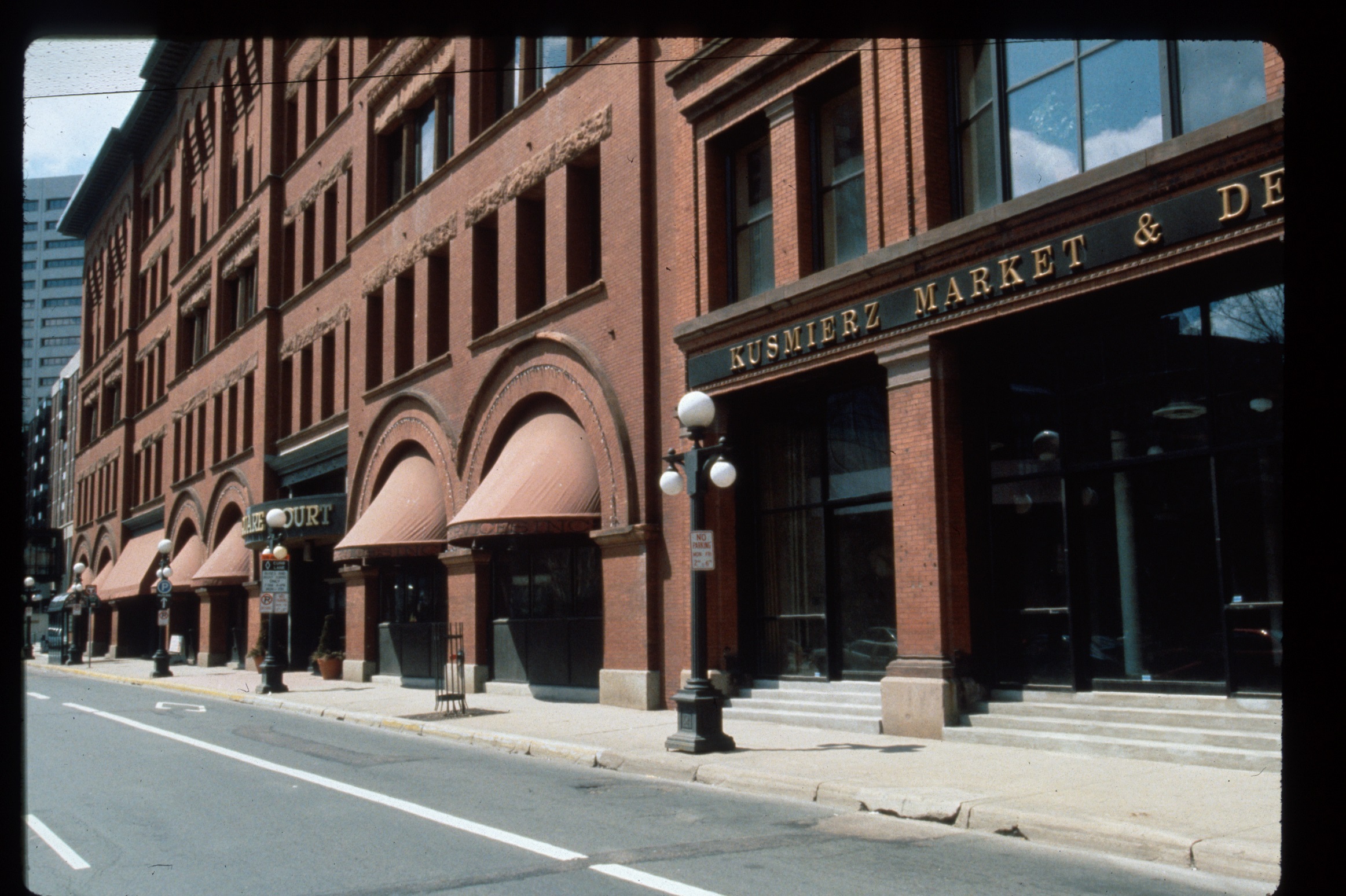 Lowertown
Lowertown 1995 Rudy Bruner Award for Urban Excellence
Lowertown is an urban renewal project that transformed an underused warehouse district in downtown St. Paul, Minnesota, into a vibrant, mixed-use urban village. For over 20 years, the city took a comprehensive approach to the redevelopment of the historic neighborhood, which is now home to thriving art studios, entertainment centers, local businesses, parks, and walk-to-work housing. The project was envisioned not as a short-term fix for a declining neighborhood but as a long-term approach to creating a vital, dynamic, economically viable, and desirable new urban neighborhood.
The successful redevelopment is the result of a collaboration between public agencies, private lenders, foundations, neighborhood organizations, artist communities, business associations, and other local organizations. More than 70 projects have been completed, and the gradual approach has allowed for incremental, preservation-oriented rehabilitation; retention of community self-reliance; and maximum leveraging of private investment.
-
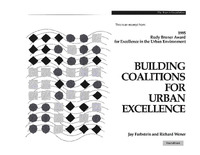 Maya Angelou Community Initiative case study
Maya Angelou Community Initiative case study
-
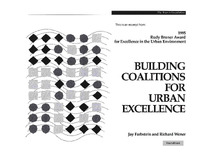 Campus Circle case study
Campus Circle case study
-
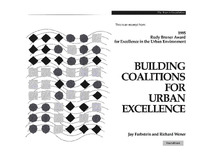 Dudley Street Neighborhood Initiative case study
Dudley Street Neighborhood Initiative case study
-
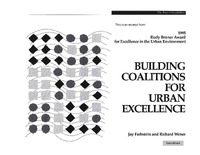 Greenpoint Manufacturing and Design Center case study
Greenpoint Manufacturing and Design Center case study
-
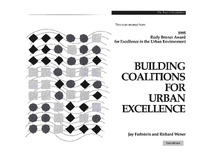 Harlem Meer Restoration case study
Harlem Meer Restoration case study
-
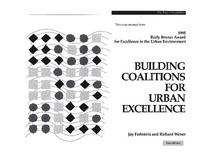 Lowertown case study
Lowertown case study
-
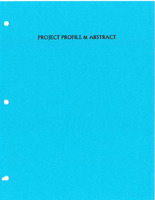 Maya Angelou Community Initiative application
Maya Angelou Community Initiative application
-
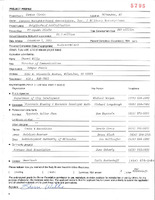 Campus Circle application
Campus Circle application
-
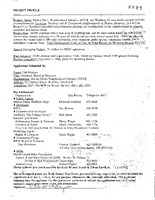 Dudley Street Neighborhood Initiative application
Dudley Street Neighborhood Initiative application
-
 Greenpoint Manufacturing and Design Center application
Greenpoint Manufacturing and Design Center application
-
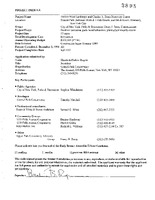 Harlem Meer Restoration application
Harlem Meer Restoration application
-
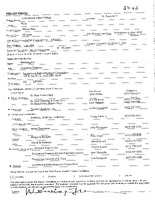 Lowertown application
Lowertown application
-
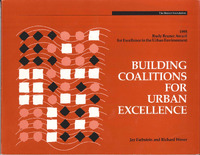 Building Coalitions for Urban Excellence: 1995 Rudy Bruner Award for Urban Excellence
Building Coalitions for Urban Excellence: 1995 Rudy Bruner Award for Urban Excellence
 Maya Angelou Community Initiative 1995 Rudy Bruner Award for Urban Excellence - Gold Medal The Maya Angelou Community Initiative is a grassroots redevelopment plan to provide long-term affordable housing to female-headed households in Portland, Oregon. The initiative renovated a deteriorated apartment complex to provide 42 units of sustainable, long-term, low-income housing primarily for households headed by single females. Supported by the nonprofit Housing Our Families, the initiative has successfully redeveloped an underused section of Portland’s troubled Boise neighborhood through an exceptionally democratic and inclusive process engaging all members of the community. Evidence of the initiative’s success include increased home ownership, reduced crime, significant growth of community organizations, and a greater sense of community. Ongoing programs continue to make improvements to the neighborhood and support economic growth in the area.
Maya Angelou Community Initiative 1995 Rudy Bruner Award for Urban Excellence - Gold Medal The Maya Angelou Community Initiative is a grassroots redevelopment plan to provide long-term affordable housing to female-headed households in Portland, Oregon. The initiative renovated a deteriorated apartment complex to provide 42 units of sustainable, long-term, low-income housing primarily for households headed by single females. Supported by the nonprofit Housing Our Families, the initiative has successfully redeveloped an underused section of Portland’s troubled Boise neighborhood through an exceptionally democratic and inclusive process engaging all members of the community. Evidence of the initiative’s success include increased home ownership, reduced crime, significant growth of community organizations, and a greater sense of community. Ongoing programs continue to make improvements to the neighborhood and support economic growth in the area. Campus Circle 1995 Rudy Bruner Award for Urban Excellence - Silver Medal Campus Circle, launched by Milwaukee’s Marquette University, revitalized a low-income neighborhood with quality mix-income housing for students and families. The university joined forces with area businesses, community organizations, and residents to develop a comprehensive approach to transforming a 90-square-block area adjacent to its campus. The $9 million university investment included three main components: building new off-campus student and staff housing, rehabilitating low-cost housing for neighborhood residents, and revitalizing commerce by developing commercial properties, all while reducing crime and increasing community involvement. Campus Circle purchased over 150 properties in the area and created over 88,000 square feet of new commercial space. Crime is down significantly and social services organizations and a police station have been integrated into the circle. More than 150 units for students have been built or renovated, and 188 units of affordable housing for residents was rehabilitated without increasing rents.
Campus Circle 1995 Rudy Bruner Award for Urban Excellence - Silver Medal Campus Circle, launched by Milwaukee’s Marquette University, revitalized a low-income neighborhood with quality mix-income housing for students and families. The university joined forces with area businesses, community organizations, and residents to develop a comprehensive approach to transforming a 90-square-block area adjacent to its campus. The $9 million university investment included three main components: building new off-campus student and staff housing, rehabilitating low-cost housing for neighborhood residents, and revitalizing commerce by developing commercial properties, all while reducing crime and increasing community involvement. Campus Circle purchased over 150 properties in the area and created over 88,000 square feet of new commercial space. Crime is down significantly and social services organizations and a police station have been integrated into the circle. More than 150 units for students have been built or renovated, and 188 units of affordable housing for residents was rehabilitated without increasing rents. Dudley Street Neighborhood Initiative 1995 Rudy Bruner Award for Urban Excellence - Silver Medal The Dudley Street Neighborhood Initiative (DSNI), a Boston community-based organization, empowered residents to revitalize a depressed neighborhood. With nearly 2,000 members, DSNI includes residents of the Roxbury and Dorchester areas near downtown and representatives of local social service agencies, businesses, and other community organizations. In its mission to reclaim the neighborhood, it purchased vacant land, established a community land trust, and replaced vacant lots and deteriorated buildings with affordable housing units, parks and playgrounds, businesses, and community facilities. DSNI is an extraordinary example of grassroots, bottom-up organizing. To carry out its comprehensive revitalization plan, it partnered with philanthropists, government officials, banks, businesses, and community development organizations to reverse decades of neglect and disinvestment in this area of Boston. Its redevelopment efforts put a stop to a series of arson fires, cleaned up derelict sites, and built quality housing with ownership opportunities for low-income families, including 36 units of owner-occupied housing at Winthrop Estates.
Dudley Street Neighborhood Initiative 1995 Rudy Bruner Award for Urban Excellence - Silver Medal The Dudley Street Neighborhood Initiative (DSNI), a Boston community-based organization, empowered residents to revitalize a depressed neighborhood. With nearly 2,000 members, DSNI includes residents of the Roxbury and Dorchester areas near downtown and representatives of local social service agencies, businesses, and other community organizations. In its mission to reclaim the neighborhood, it purchased vacant land, established a community land trust, and replaced vacant lots and deteriorated buildings with affordable housing units, parks and playgrounds, businesses, and community facilities. DSNI is an extraordinary example of grassroots, bottom-up organizing. To carry out its comprehensive revitalization plan, it partnered with philanthropists, government officials, banks, businesses, and community development organizations to reverse decades of neglect and disinvestment in this area of Boston. Its redevelopment efforts put a stop to a series of arson fires, cleaned up derelict sites, and built quality housing with ownership opportunities for low-income families, including 36 units of owner-occupied housing at Winthrop Estates. Greenpoint Manufacturing and Design Center 1995 Rudy Bruner Award for Urban Excellence - Silver Medal The Greenpoint Manufacturing and Design Center (GMDC) in Brooklyn, New York, is an arts and industry complex with incubator and studio space for artisan businesses. The center was created and is managed by a collective of woodworking manufacturers, crafts people, and artisans who formed the collective to purchase their building—a historic mill in Greenpoint—and save the complex when ownership of the building was transferred to the city. GMDC preserved the historic building and transformed it into a thriving artist and artisan network where expertise, equipment, and supplies are shared and sold. The renovation established space for incubator workshops and studios with easy access to downtown markets. The space protects 21 businesses, creates jobs, and provides support services and workspace for small artisan businesses. GMDC offers an unusual but highly successful model for small-scale, urban industrial cooperatives. It has since expanded to rehabilitate six other manufacturing buildings to create similar spaces for artisans and manufacturing entrepreneurs.
Greenpoint Manufacturing and Design Center 1995 Rudy Bruner Award for Urban Excellence - Silver Medal The Greenpoint Manufacturing and Design Center (GMDC) in Brooklyn, New York, is an arts and industry complex with incubator and studio space for artisan businesses. The center was created and is managed by a collective of woodworking manufacturers, crafts people, and artisans who formed the collective to purchase their building—a historic mill in Greenpoint—and save the complex when ownership of the building was transferred to the city. GMDC preserved the historic building and transformed it into a thriving artist and artisan network where expertise, equipment, and supplies are shared and sold. The renovation established space for incubator workshops and studios with easy access to downtown markets. The space protects 21 businesses, creates jobs, and provides support services and workspace for small artisan businesses. GMDC offers an unusual but highly successful model for small-scale, urban industrial cooperatives. It has since expanded to rehabilitate six other manufacturing buildings to create similar spaces for artisans and manufacturing entrepreneurs. Harlem Meer Restoration 1995 Rudy Bruner Award for Urban Excellence - Silver Medal The Harlem Meer project restored 17 acres in the northeast corner of New York City’s Central Park, reconnecting it to surrounding inner-city communities. The Central Park Conservancy and City of New York Department of Parks and Recreation worked together to clean up a polluted 11-acre lake, restore the surrounding landscape, renovate a historic boathouse and playground, and build a new discovery center to revitalize the park and nearby neighborhoods. The project restored a seriously degraded natural habitat and returned a beautiful and important amenity to the area. The Charles A. Dana Discovery Center hosts free community programs and exhibits to educate visitors about the ecosystem and wildlife, and visitors can enjoy a wide range of activities, including fishing, skating, and swimming. The Harlem Meer has helped reintegrate the north and south ends of the park, and the Conservancy worked closely with local neighborhoods throughout the planning process.
Harlem Meer Restoration 1995 Rudy Bruner Award for Urban Excellence - Silver Medal The Harlem Meer project restored 17 acres in the northeast corner of New York City’s Central Park, reconnecting it to surrounding inner-city communities. The Central Park Conservancy and City of New York Department of Parks and Recreation worked together to clean up a polluted 11-acre lake, restore the surrounding landscape, renovate a historic boathouse and playground, and build a new discovery center to revitalize the park and nearby neighborhoods. The project restored a seriously degraded natural habitat and returned a beautiful and important amenity to the area. The Charles A. Dana Discovery Center hosts free community programs and exhibits to educate visitors about the ecosystem and wildlife, and visitors can enjoy a wide range of activities, including fishing, skating, and swimming. The Harlem Meer has helped reintegrate the north and south ends of the park, and the Conservancy worked closely with local neighborhoods throughout the planning process. Lowertown 1995 Rudy Bruner Award for Urban Excellence Lowertown is an urban renewal project that transformed an underused warehouse district in downtown St. Paul, Minnesota, into a vibrant, mixed-use urban village. For over 20 years, the city took a comprehensive approach to the redevelopment of the historic neighborhood, which is now home to thriving art studios, entertainment centers, local businesses, parks, and walk-to-work housing. The project was envisioned not as a short-term fix for a declining neighborhood but as a long-term approach to creating a vital, dynamic, economically viable, and desirable new urban neighborhood. The successful redevelopment is the result of a collaboration between public agencies, private lenders, foundations, neighborhood organizations, artist communities, business associations, and other local organizations. More than 70 projects have been completed, and the gradual approach has allowed for incremental, preservation-oriented rehabilitation; retention of community self-reliance; and maximum leveraging of private investment.
Lowertown 1995 Rudy Bruner Award for Urban Excellence Lowertown is an urban renewal project that transformed an underused warehouse district in downtown St. Paul, Minnesota, into a vibrant, mixed-use urban village. For over 20 years, the city took a comprehensive approach to the redevelopment of the historic neighborhood, which is now home to thriving art studios, entertainment centers, local businesses, parks, and walk-to-work housing. The project was envisioned not as a short-term fix for a declining neighborhood but as a long-term approach to creating a vital, dynamic, economically viable, and desirable new urban neighborhood. The successful redevelopment is the result of a collaboration between public agencies, private lenders, foundations, neighborhood organizations, artist communities, business associations, and other local organizations. More than 70 projects have been completed, and the gradual approach has allowed for incremental, preservation-oriented rehabilitation; retention of community self-reliance; and maximum leveraging of private investment. Maya Angelou Community Initiative case study
Maya Angelou Community Initiative case study  Campus Circle case study
Campus Circle case study  Dudley Street Neighborhood Initiative case study
Dudley Street Neighborhood Initiative case study  Greenpoint Manufacturing and Design Center case study
Greenpoint Manufacturing and Design Center case study  Harlem Meer Restoration case study
Harlem Meer Restoration case study  Lowertown case study
Lowertown case study  Maya Angelou Community Initiative application
Maya Angelou Community Initiative application  Campus Circle application
Campus Circle application  Dudley Street Neighborhood Initiative application
Dudley Street Neighborhood Initiative application  Greenpoint Manufacturing and Design Center application
Greenpoint Manufacturing and Design Center application  Harlem Meer Restoration application
Harlem Meer Restoration application  Lowertown application
Lowertown application  Building Coalitions for Urban Excellence: 1995 Rudy Bruner Award for Urban Excellence
Building Coalitions for Urban Excellence: 1995 Rudy Bruner Award for Urban Excellence